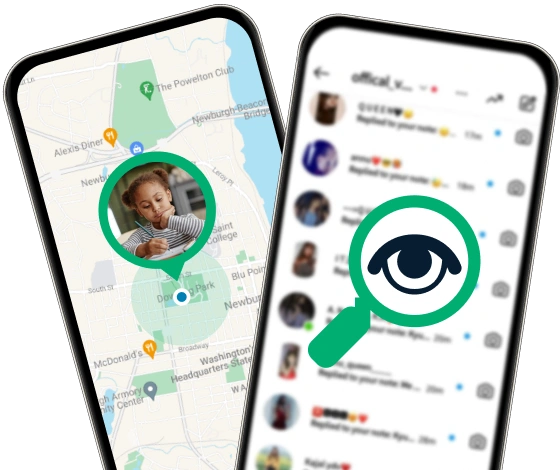Scams are everywhere. Recent research of the F-Secure digital protection company has shown that 34% of people reported experiencing cyber scams in the past 12 months, 85% received at least one digital scam attempt, and 35% of these scams were conducted via email.
AI has also influenced the growth of fraudulent attacks, as online predators frequently use the tool to make their phishing attacks more sophisticated and complex to detect. Moreover, the Federal Trade Commission reported over 8.8 billion in consumer losses to scams in 2022, marking a significant increase from previous years. This trend continues to grow in 2024 as cybercriminals constantly develop new strategies to exploit vulnerabilities.
So, how can you protect your kid from this kind of online danger? How can you ensure your child is safe and sound when chatting online? For parents worrying about their kids’ safety and privacy, reading this article is a must.
What Are Online Predators?
First, let’s briefly answer the question, “What is an online predator?” We will explain how they operate and share key facts to help you recognize and protect your child from an online predator they may meet online.
Online Predators Definition
So, what are online predators? They are individuals who use the internet to exploit children and teens for sexual and violent purposes. Predators often start by building strong and seemingly trustworthy relationships with a child to gain their trust. Over time, this can lead to grooming, where they engage the child in sexual activities, expose them to inappropriate materials and pictures, etc., and subject them to online harassment and threats to cause fear or embarrassment.
Online Predators Statistics
Some people might believe that the online predator problem is overblown. Unfortunately, this is not the case. While it is always possible to be paranoid, you should be mindful of your children’s online risks when they’re online.
- According to the Federal Bureau of Investigation, over 50% of kids between the ages of 12 and 15 are the most frequent victims of grooming or being manipulated by adults with unhealthy intentions.
- Child Crime Prevention & Safety Center reported the following:
- 89% of child sexual abuse occurs in online chat rooms or IM apps.
- 4% of kids receive aggressive harassment from adults online, including attempts to meet in person or contact them over the phone.
- 20% of children aged 8-11 are informed about strangers who can easily access their information online.
- 40% of children on social media remove privacy settings to attract more friends or followers.
- Almost 60% of parents are concerned about threats from strangers online.
As you can see, the information provided above does not look optimistic. Child predators on social media are everywhere, and you, as a parent, must be vigilant everywhere you turn.
Online Predators Facts
Well, what are the facts about online predators you must know about? Here are a few of the most common ones:
- 5% of online predators pretend they are kids.
- Some online predators ask for sexual content photos immediately and give up if they are refused immediately.
- New England Journal of Public Policy claims that online predators choose chat rooms, online games (Roblox, Minecraft, Clash of Clans), and social media platforms as the easiest way to find their victims.
- According to online predator statistics, 60% of sexual online victims are female.
- Typical tactics of online predators include pretending to be a peer, offering gifts or money, and creating fake profiles to gain trust.
- LGBT youth reported more peer victimization and unwanted sexual experiences than non-LGBT youth.
- Other online predators facts suggest that advanced technology and AI have made it easier for predators to manipulate their victims.
How Many Online Predators Are There?
Many people are interested in how many online predators are there in the world, and when they hear the answer, they are shocked. As per the 2024 online predator statistics, there are over 500K active online predators searching for their victims online in the US daily. The most frequent victims of their unhealthy online manipulations are teens and children who use social media platforms, play online games, or visit online chat rooms for communication.
How Dangerous Are Online Predators?

Every responsible parent caring about their kid’s mental and physical well-being is a top-notch priority. Because almost every kid at the age of 7 gets their phone, parents should be aware of all the dangers their kid may face when navigating online. One of them, and one of the most serious ones, is online predators. For this reason, parents must educate their kids about online predators, how they can harm them, and what should be done to avoid it.
So, here are the consequences of communicating with online predators your kid should know about:
- Sexual exploitation: Online predators can groom kids for sexual purposes, encouraging them to share explicit content, nude photos or videos, or, what is even more shocking, engaging in sexual activity.
- Cyberbullying: Online predators can bully and intimidate their victims by spreading rumors or embarrassing information.
- Loss of privacy: They can build friendly relationships with your kid and trust them so much that they share their personal information or credit card details, which can lead to identity theft or financial loss.
- Emotional manipulation: Online predators may be so polite and kind with your kids that they trust them in everything. As a result, they will obtain control over their emotional well-being.
- Physical safety risks: Predators may attempt to arrange personal meetings with your kid, putting their victims at risk of bodily harm or abduction.
- Impact on educational life: Kids may have problems at school due to the emotional effects of predatory interactions.
Common Tactics of Online Predators
One risk your children have while online is falling victim to online predators who intend to kidnap and use them for labor, sexual slavery, or other horrifying intentions. Many online predators have special tactics in place to lure your children. Here are some of them.
- They approach children who have little friends, feel alone, have no money, or feel rebellious. If your child has suffered abuse or is in a fractured home, it can increase the child’s risk of becoming vulnerable.
- Predators go after children and teens due to how naive they can be, but they can be more emotionally vulnerable to children going through personal difficulties.
- They will make many promises to children, such as fame, freedom, or love.
- Child predators will go to social media and try to lure children there. Sometimes, they may pose as children closer to the victim’s age, as it’s easy to pretend to be someone you’re not on social media.
- An online predator will form close relationships with them and build their trust on social media. Then, they might ask to meet up somewhere, and the child has fallen victim to the predator.
- In real life, a predator will try to kidnap children or teens through areas where they hang out. There is no place safe for children, from schools, movie theaters, malls, concerts, parties, or airports. In any location that has youth in it, predators might lurk. Because these areas are filled with people, a trafficker may target someone alone.
Remember, many teenagers are open books. They tend to overshare, leading them to become targets of predators. It’s estimated that over half of teens ages 16 to 17 share some personal information. This can lead to a teen falling to a predator, so beware.
How Do Online Predators Find Their Victims?
In most cases, online predators looking for new victims visit social media platforms, public chat rooms, and online games with chat features to find and target potential victims. If, for example, your kid’s social media account is open (not set into private mode), they can leave comments under their posts or write them DMs.
Well, how do online predators find their victims? Here are the steps involved.
- Once they find their victim, they will say gentle words and pleasant compliments to obtain trust, lie about their age, and pretend to be a little older than their potential victim. Frequent responses to stories and likes will also strengthen relationships and make it easier to groom your kid.
- When an online predator notices that kids respond to their messages or answer comments and regularly chat with them when playing online games, they can start asking them private questions, for example, how well they communicate with their parents, how many friends they have, what the relationships with their peers at school are, etc. They do it to find a weak point.
- When found, they will build walls between a child and their parents or peers to further isolate them. Once kid realizes that only the friends they chat with online can support them, they start believing no one can listen to them better than them – and that is where the second stage of online predators’ plan takes place.
- A kid starts chatting with an online predator more often. They wake up and fall asleep with a phone in their hands, typing a new text message to their “close friend”. Now, they believe they have strong relationships with someone they want to protect, and conversations become more intimate.
- The online predator may ask intimate questions to a kid to interest them. They may share nude or partially nude photos of themselves or other children. Then, they may encourage your kid to share partially or fully nude photos/videos with them.
- Once a child shares images or videos, the online predator gains control and may threaten to share these images with the child’s parents or friends to force the child to send more. It is called sextortion. The main goal here is to turn emotionally dependent relationships into emotionally controlling and abusive ones.
Signs That Your Child Is Being Groomed by Online Predator
A child predator might try to take a slow-burn approach to your child, known as child grooming. Online predators can build a child’s trust in time and might even try to make the trust of the adults who surround them. Often, grooming can be subtle, and a child might not know it until it’s too late.
Here are some signs that your child might be being groomed.
- Groomers can be secretive. If your child is being groomed, they may become defensive if you try to pry into their online conduct. They might change screens, close tabs, or become emotional if you ask.
- If your child is being groomed, they might be online more than usual.
- Look for changes in how your child communicates online. They might start using unfamiliar apps or messaging platforms, or their conversations may become more secretive and less open.
- Your child might display unexplained mood swings, become unusually withdrawn, or seem anxious or depressed.
- If your child starts receiving gifts, money, or other perks from online contacts that they do not want to discuss, it could be a sign that an online predator is manipulating them.
- The groomer might befriend you as well. They might ask to speak to you, and you might even like them. They might pose as a child’s role model or another child or teen.
- Your child wants to go somewhere they have never been interested in. Unfortunately, this place could be the area where a predator wants to meet the child.
As you can see, online predators are secretive, and many signs can be mistaken for typical teenage behavior. For example, many children want privacy online and can be reticent about their views, but they aren’t being groomed. However, any suspicious activity should be investigated by you ASAP.
Legal Consequences for Online Predators
The legal consequences a predator may face can depend on your state. Many laws, such as the age of consent or specific details, can differ. Therefore, check your local laws to see how a predator is punished in your area.
However, in all states, we should note that statutory rape is a crime punishable by prison and requires the person to register as a sex offender for life. In addition, there might be specific laws, such as adults being unable to corrupt a minor through sexually explicit conversation.
What should you do if your kid has become a victim of online predators?
- Firstly, call your local police department or 911 and report any immediate danger. Many police departments have specialized cybercrime units that handle cases involving online predators.
- Report online services/platforms where grooming has occurred.
- Contact local child protective services or organizations specializing in child safety for guidance and support.
- To recover after the mental/physical trauma, you must find a mental health professional to help your kid recover.
- Remember to talk with your kid as much as possible. Build strong and friendly relationships with them so that they always know you are not only a person with whom they can freely share their achievements and success but also a shoulder they can cry on.
How to Talk to Your Child About Online Predators
You must talk to your child about online predators as soon as you notice they start using social media, playing online games, or visiting chat rooms for communication. Explain to them why they should not share personal information with strangers and what the consequences may be. Be calm but serious. Let them know they can always rely on you and tell you everything as soon as they feel something weird or uncomfortable happens to them.
Parental Tips to Protect Your Child from Online Predators
Well, how can you, as a parent, protect your kid from an online predator? We’ll break it down without further ado.
Stay Safe from Online Predators with the uMobix Parental Control App
Installing a reliable monitoring app on their cell phone is one of the most effective solutions to always know about your kid’s online activities. With uMobix, you will be able to:
- Read all the text messages they send and receive through the most popular social media platforms and IM apps (for iPhone, you will get a killer feature enabling you to respond to the text messages you receive on Instagram and Facebook).

- Find out whether they use dating apps and what text messages they share there.

- Check whether they do not contact strangers through phone calls, SMS, or MMS. If so, block suspicious numbers.

- You will also be able to listen to their surroundings to check, for example, that they are at school, not anywhere else.

- With the camera snapshot feature, you can use their front or back camera to take a picture of those who are close to them.
The list of features this parental control app offers is not limited to the above-mentioned. There are 40+ advanced monitoring features it involves, and all of them are designed to protect your kid.
Monitor Online Activity
Children spend a lot of time online. Therefore, you should monitor their online activities and set limits on the amount of time they spend online. Enabling screen time limits using built-in phone features and third-party parental controls will let you manage how long they hang out online and what they consume.
E.g: At nighttime, this method will be the most helpful, as it will ensure that they really sleep and do not chat with potential users.
Talk to Your Child
Talk about the dangers of speaking to a stranger online about sexual topics, and discuss what can happen if they do so. Be sure to tell them that many predators can pose as people their age and that they need to be skeptical of anyone they meet.
E.g: Advise them to immediately tell you if they notice anything suspicious when communicating with someone (too much attention from a new friend, odd text messages, very delicate topics, or the intention to share their private data or tell about their surroundings, friends, or parents).
Keep Personal Information Private
Personal should always be personal. Your child must understand what information can be shared online and what cannot (home address, school name, or phone number). Tell them about the online predators definition and how important it is to inform you if they notice anything odd or suspicious.
E.g: You may tell your kid the following: “If someone you don’t know asks for our home address or your phone number, or if they make you feel uncomfortable in any way, you must come and tell me immediately”.
Stay Involved
You must be involved in your child’s online communications to keep them safe. By staying engaged, you can teach them responsible online behavior and support them if needed.
E.g: Be a good friend so they can always trust you with their secrets, problems, and emotions.
Conclusion
Online predators pose significant threats to children’s safety, using various tactics to exploit them through social media, online games, and chat rooms. Because over 50% of children aged 12-15 are groomed online, parents must do their best to protect them.
Now you know how to talk to your child about online predators to stay on the safe side. Explain the dangers of sharing sensitive information online, tell them about online predators and how to detect them, be actively involved in their online activities, use parental control app uMobix, and always be a supportive and nonjudgmental friend so they can trust you with anything. It’s better for them to be a “mummy’s kid” than someone’s victim.

Latest posts
- 10 Best Apps for Parents to Monitor Social Media: 2026 Guide
- Complete List of Keywords to Block for Parental Control
- Does Telegram Notify Screenshots? Everything About Screenshot Detection
- How to Find Someone’s Deleted Instagram Posts: Complete Guide
- Family Tracking App by uMobix: Keep Loved Ones Safe




